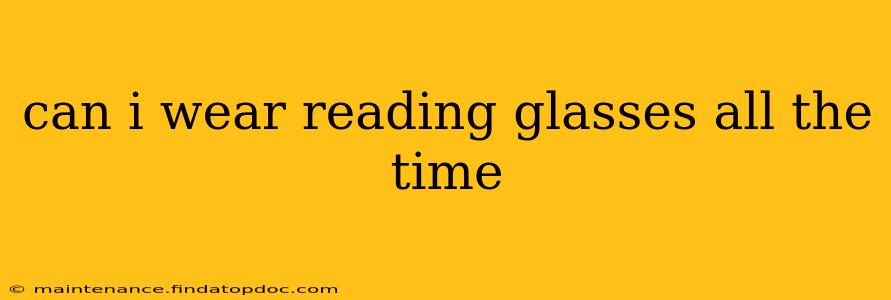Many people wonder if they can wear their reading glasses constantly, even when they don't need them for close-up tasks. The answer isn't a simple yes or no, and depends on several factors. While it's generally safe for most people, understanding the potential benefits and drawbacks is crucial. This article will delve into the question, addressing common concerns and providing a balanced perspective.
What Happens If You Wear Reading Glasses All the Time?
The impact of wearing reading glasses continuously depends on your vision correction needs and individual eye health. For individuals with presbyopia (age-related difficulty focusing on near objects), wearing reading glasses all the time might seem like a convenient solution. However, it's important to note that constant wear doesn't necessarily improve your vision; it simply allows you to see nearby objects more clearly.
For those without presbyopia, constantly wearing reading glasses could lead to eye strain, headaches, and potentially even blurry distance vision. This is because the glasses are forcing your eyes to focus differently than they naturally would.
Will Wearing Reading Glasses All the Time Hurt My Eyes?
Generally, wearing reading glasses all the time won't directly hurt your eyes. However, prolonged use can cause discomfort and potentially exacerbate existing eye problems. The most common side effects include:
- Eye strain and headaches: Your eyes are constantly working to accommodate the lens's correction, potentially leading to fatigue and headaches.
- Blurry distance vision: Reading glasses only correct for near vision; wearing them constantly can make it harder to see distant objects clearly.
- Dry eyes: Reduced blinking while concentrating on near objects, often exacerbated by glasses, can contribute to dry eye syndrome.
Is It Bad to Wear Reading Glasses When You Don't Need Them?
Whether it's "bad" depends on your individual circumstances. For someone with presbyopia, it's generally considered acceptable to wear their reading glasses consistently for comfort and convenience. However, it's crucial to consult an ophthalmologist or optometrist for personalized advice. They can assess your overall eye health and determine if continuous wear is appropriate for you. For those without presbyopia, prolonged use without necessity is generally discouraged.
Can I Wear Reading Glasses All Day Even If I Don't Have Presbyopia?
No, it's generally not recommended to wear reading glasses all day if you don't have presbyopia or another condition requiring near vision correction. Doing so can strain your eyes and potentially lead to the side effects mentioned above, such as headaches and blurry distance vision. Your eyes will adapt to the lens correction, potentially leading to difficulties when you remove the glasses.
Should I Get Progressive Lenses Instead?
Progressive lenses, also known as multifocal lenses, offer a gradual transition between different vision corrections, smoothly accommodating near, intermediate, and distance vision. They are a popular choice for individuals with presbyopia because they eliminate the need to constantly switch between different glasses. If you're experiencing discomfort with reading glasses all day, progressive lenses might be a better solution. However, it's essential to consult an eye care professional to determine if progressive lenses are suitable for your needs.
When Should I See an Eye Doctor About Reading Glasses?
Regular eye exams are crucial for maintaining good eye health, regardless of whether you wear glasses. Schedule an appointment with your eye doctor if you experience:
- Persistent eye strain or headaches
- Blurred vision at any distance
- Any changes in your vision
In conclusion, while wearing reading glasses all the time might be convenient for some, it's not universally recommended. Always consult an eye care professional to determine the best course of action for your individual needs and eye health. They can assess your vision, advise on appropriate eyewear, and address any concerns. They will provide personalized recommendations tailored to your specific situation.
